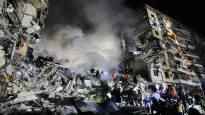The ordinary Russian is not necessarily very aware of what is happening in Ukraine, writes Russia correspondent Heikki Heiskanen.
Heikki HeiskanenRussia correspondent
MOSCOW Watching Russian state television news, you wouldn’t know that a Russian missile that hit a residential building on Saturday killed dozens of civilians in the city of Dnipro, Ukraine.
On Sunday, Ykköskanava’s six o’clock newscast featured a plane crash in Nepal that claimed around 70 lives.
The news about the war in Ukraine listed information provided by the Ministry of Defense. The report told how the Russian troops took over the town of Soledar.
The women who were said to have been evacuated from Soledar said they had been waiting for the Russians to come like New Year’s. The reporter says that Ukrainian forces used civilians as human shields and resented speaking Russian.
In the broadcast, the characteristics of the T-90M “Proryv” tank are also presented in an enthusiastic tone and it is implied that the German Leopard tank would have no objection to it.
Russian state television is calling The Ukrainian troops are preferably nationalists, as if the battles are not fought against the armed forces of official Ukraine.
The main broadcast at 9 pm continued to discuss the “liberation” of Soledar: Ukraine is said to have thrown its soldiers into a “meat grinder”, while Russia advanced with small losses.
In addition, it was reported, among other things, about the actions of the Ukrainian authorities against the churches under the Moscow Patriarchate.
In his Sunday evening statement, the President of Ukraine Volodymyr Zelenskyi accused the Russians of cowardly silence, but the Russian man in the street may not be particularly well informed about the events in Dnipro.
Russian state television has created own reality. You can look for an alternative narrative on social media, but warlike channels whose administrators want more and harder war are very active there. Reading critical Russian media usually requires a private VPN connection.
Not many people on the street are in a hurry to comment on the war. The topic is not pleasant. The background must also be the fear that wrong opinions can lead to losing one’s job or study, or even going to prison.
Despite all this, it would be wrong to say that the Russians do not show their minds.
The non-governmental organization following the arrests OVD-info provides statistics (you switch to another service) between February 24 and December 14 of last year, 19,428 arrests for various anti-war statements.
In a period of only 29 days, no one was arrested in Russia for anti-war.
There are individual opinions here and there almost daily. A citizen stands in a public place with a sign and is soon arrested.
So there is anti-war, but it is difficult to organize it into a mass movement. The Russian authorities have systematically dismantled the structures of the opposition.
The February-March demonstrations rose from the grassroots level, but longer-term action would require organization, which is difficult under constant pressure.
The results of opinion polls are worth it In the current conditions of Russia read with great caution, but in December Levada center (you will switch to another service) asked the Russians: “What do you think, are people like you morally responsible for the deaths and destruction of civilians in Ukraine?”
59 percent of respondents said absolutely not.
However, 10 percent felt that they definitely are, and 24 percent answered: yes, to some extent.
According to this, 34 percent of the respondents felt some degree of moral responsibility for the events in Ukraine. The amount can be considered quite large when you take into account the conditions in modern Russia.
